Delving into the Comforting Realm of Coffee Shops
Coffee shops are establishments where customers can buy and enjoy a variety of coffee-based beverages, along with occasional refreshments. Throughout history, they have served as social hubs for people to unwind, connect with others, pursue their work, or savor a delightful cup of coffee. These cozy spots typically offer various options, including espresso, cappuccino, latte, Americano, and more. Often crafted from diverse coffee beans and brewing techniques.
Coffee shops, besides serving coffee, frequently offer a delightful assortment of tea, pastries, sandwiches, and other light snacks. Some establishments have even expanded their repertoire to include specialty teas, refreshing cold beverages, and even alcoholic drinks during the evening hours. In today's world, many modern coffee shops also prioritize a warm and welcoming ambiance by providing complimentary Wi-Fi access to comfortable seating arrangements conducive to relaxation and socialization. To further enhance the experience for their patrons, some locations may even provide board games or books to encourage extended stays.
Coffee shops range from small, locally owned businesses to large chain franchises. They play a significant role in urban culture. They are often associated with creative or intellectual activities, with people using them as spaces to work, hold meetings, or engage in discussions.
1. The Coffee Shop Culture
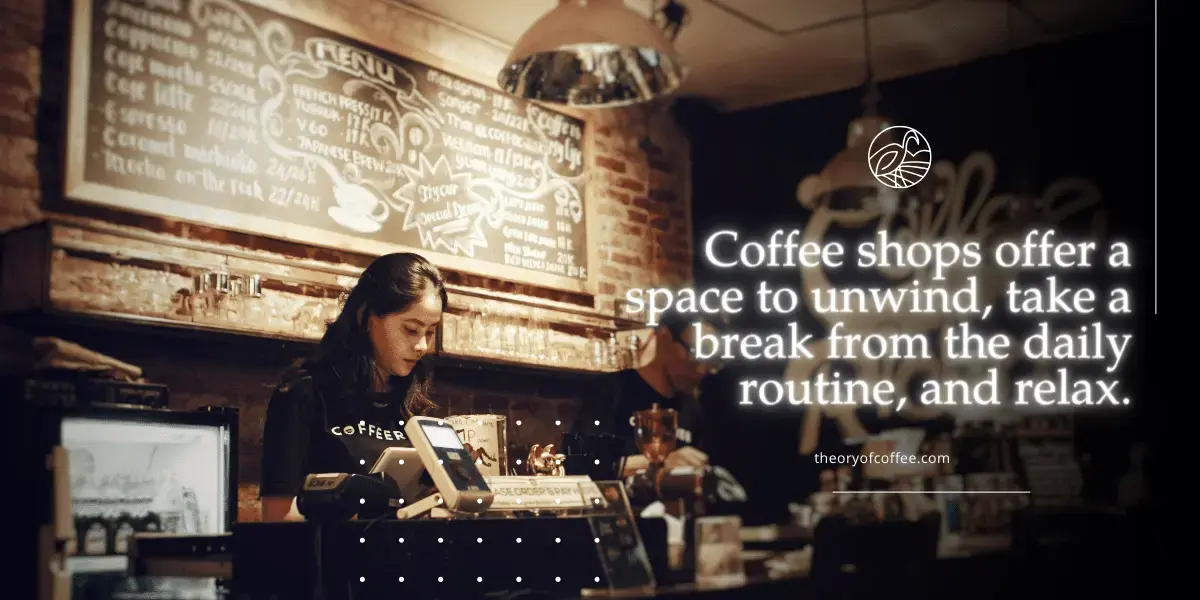
The coffee shop culture refers to coffee shops' social, behavioral, and communal aspects. It's a collective set of behaviors, values, and interactions developed around coffee consumption and the spaces where coffee is served. Coffee shop culture has evolved and varies in different regions and communities, but it generally encompasses the following elements:
- Social Gathering: Coffee shops historically served as places for people to gather, share ideas, and engage in conversations. They provided a neutral ground for discussions, debates, and interactions outside formal settings like offices or homes.
- Relaxation and Escapism: Coffee shops offer a space to unwind, take a break from the daily routine, and relax. The aroma of coffee, soothing music, and comfortable seating create an environment conducive to relaxation and mental rejuvenation.
- Community Hub: Many coffee shops are deeply integrated into their local communities. They often host events, workshops, and gatherings that promote a sense of belonging and shared interests among patrons.
- Cultural Expression: Coffee shops can showcase local art, music, and literature. They become platforms for cultural expression, allowing artists and creators to display their work and engage with a broader audience.
- Creative and Intellectual Spaces: Coffee shops have been associated with creativity and intellectual pursuits. Writers, artists, students, and professionals often find coffee shops conducive to brainstorming, working on projects, or studying.
- Personalization and Rituals: Regular customers often develop personalized orders and routines. Baristas might know customers' preferences, creating a sense of familiarity and comfort.
- Connection and Networking: Coffee shops facilitate casual interactions and networking. People can meet colleagues, friends, or potential collaborators in a relaxed setting.
- Global Connectivity: Coffee shops are found worldwide, making them accessible spaces for travelers to connect with locals and other travelers. This fosters a global sense of community and sharing.
- Adapting to Technology: With the rise of technology, coffee shops have embraced features like free Wi-Fi, allowing patrons to work remotely, study, or engage with digital content while enjoying coffee.
- Ethical and Sustainable Consumption: As consumers become more conscious of ethical sourcing and sustainability, coffee shops have responded by offering Fair Trade, organic, and ethically sourced coffee options.
- Aesthetic Experience: The coffee shops' design, decor, and ambiance create a unique experience beyond just the coffee. Aesthetic elements invite customers to immerse themselves in the surroundings.
- Multifunctional Spaces: Coffee shops often serve multiple purposes, from morning coffee runs to afternoon meetings and social hangouts. This adaptability contributes to their cultural relevance.
Coffee shop culture encapsulates these spaces' blend of comfort, connection, creativity, and community. It reflects societal shifts and changing preferences, creating environments catering to various personal and social needs.
2. Aesthetic and Atmosphere
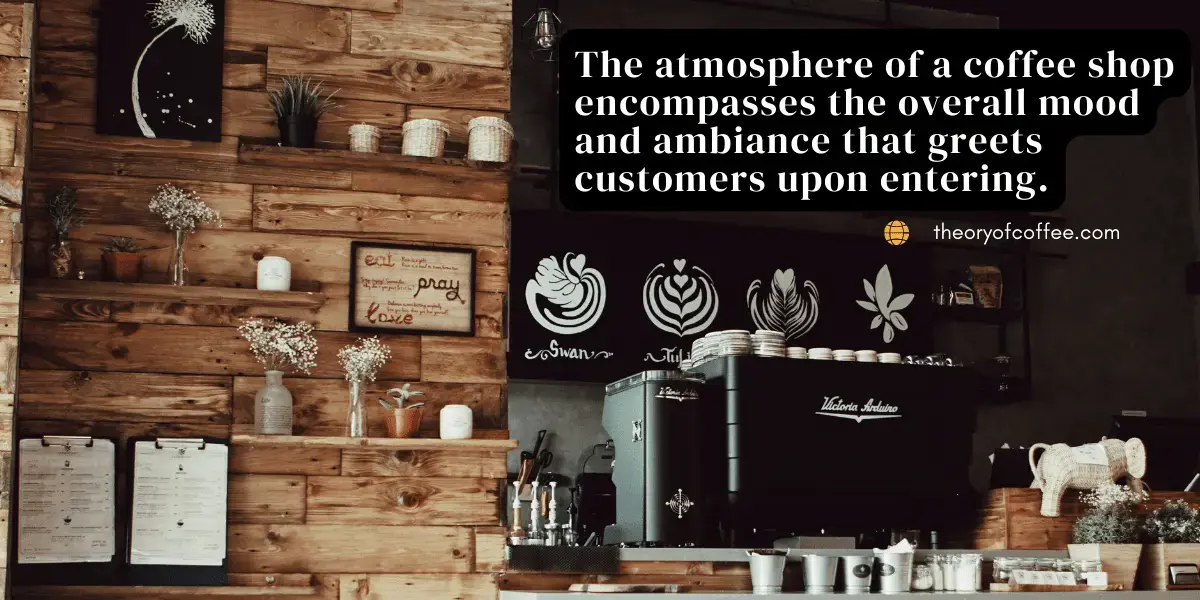
The aesthetic and atmosphere of a coffee shop play a crucial role in shaping the overall experience for customers. This aspect goes beyond the coffee itself and focuses on the visual and sensory elements that make a coffee shop unique and inviting. Here's a more detailed explanation:
2.1. Aesthetic
The aesthetic of a coffee shop refers to its visual design, decor, and overall style. It encompasses elements such as interior design, color schemes, furniture, lighting, and even the presentation of food and drinks. Coffee shops often adopt specific aesthetics to create a distinct identity and attract a certain clientele. Some typical coffee shop aesthetics include:
- Minimalist: This aesthetic emphasizes clean lines, neutral colors, and a clutter-free environment. Minimalist coffee shops often have simple furniture, unobtrusive decor, and a sense of tranquility.
- Industrial: The industrial aesthetic embraces raw and unfinished elements like exposed brick walls, metal accents, and open ceilings. It can give a coffee shop a modern and urban feel.
- Rustic: Rustic coffee shops use natural materials like wood and stone to create a cozy and nostalgic atmosphere. They might have vintage or handmade decor items.
- Scandinavian: Inspired by Nordic design principles, Scandinavian coffee shops are characterized by light colors, natural materials, and a focus on functionality and simplicity.
- Bohemian: Bohemian coffee shops often feature eclectic and vibrant decor, mixing patterns, textures, and colors to create a relaxed and artistic vibe.
2.2. Atmosphere
The atmosphere of a coffee shop encompasses the overall mood and ambiance that greets customers upon entering. Various elements shape it, including the visuals, lighting, background music, fragrances, and the conduct of staff members and fellow patrons. Several key components contribute to the coffee shop atmosphere:
- Lighting: Lighting sets the tone. Soft, warm lighting can create a cozy and intimate atmosphere, while bright lighting may encourage productivity and social interaction.
- Music: The choice of music can significantly impact the mood. Upbeat tunes energize customers, while softer music promotes relaxation.
- Seating: The arrangement and type of seating—whether cozy couches, communal tables, or individual nooks—can influence how customers interact with the space and each other.
- Scent: The aroma of freshly brewed coffee, baked goods, and sometimes even candles can contribute to the overall sensory experience.
- Staff Interaction: Friendly and attentive staff can make customers feel welcome and comfortable, enhancing the overall atmosphere.
- Local Touches: Coffee shops often incorporate local art, photography, or cultural elements that reflect their community, creating a unique and personal atmosphere.
The aesthetic and atmosphere of a coffee shop work together to create a space beyond providing coffee and refreshments. They contribute to the coffee shop's brand, influence customers' feelings, and play a significant role in making it a place people want to visit and spend time in.
3. Beyond Coffee: Menu Delights
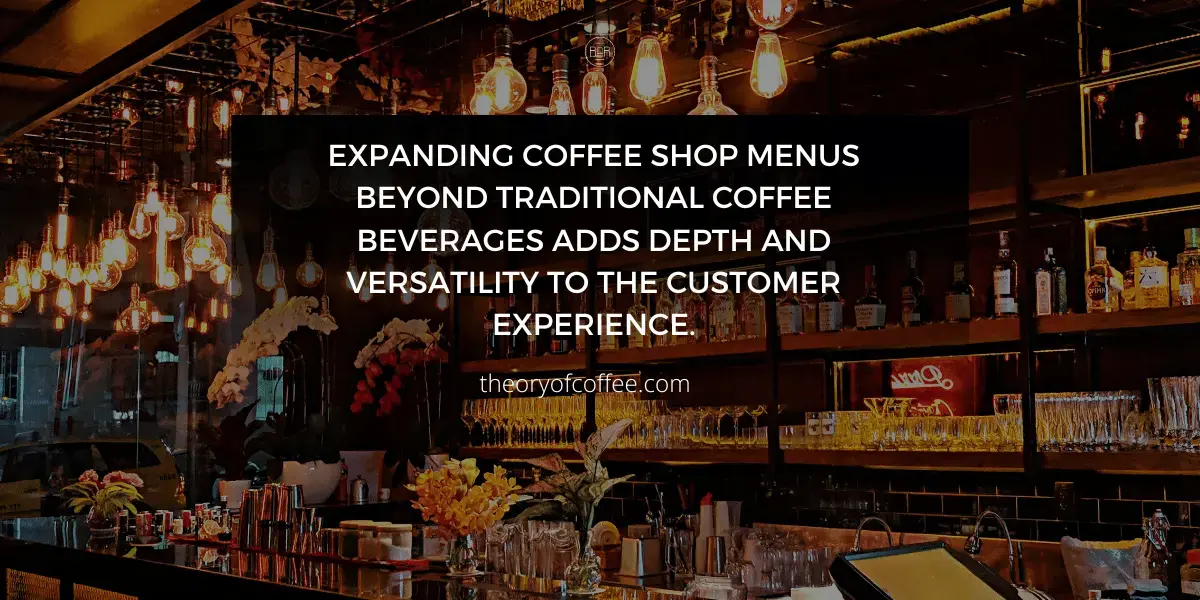
Beyond Coffee: Menu Delights in coffee shops refer to the variety of food offerings and non-coffee beverages that are available alongside the traditional coffee menu. Coffee shops have expanded their offerings to include a range of snacks, pastries, light meals, and alternative beverages to cater to a broader customer base and provide a more complete dining experience. This diversification aims to attract customers who may not be avid coffee drinkers or want complementary items to enjoy with their coffee. Here's a breakdown of what "Beyond Coffee: Menu Delights" might include:
- Pastries and Baked Goods: Coffee shops often provide an assortment of delectable pastries, including croissants, muffins, scones, danishes, and cookies. These delectable treats are beloved options for savoring alongside a cup of coffee while conveniently satisfying hunger pangs.
- Sandwiches and Wraps: Many coffee shops have expanded their menus to include sandwiches, wraps, and paninis. These options provide more substantial choices for customers looking for a light lunch or a savory snack.
- Salads and Healthy Options: To cater to health-conscious customers, some coffee shops offer salads, yogurt parfaits, and other nutritious options. These items appeal to those seeking a balanced meal or a lighter alternative.
- Vegan and Gluten-Free Options: Coffee shops are increasingly aware of dietary restrictions and preferences. They often provide vegan, vegetarian, and gluten-free choices to accommodate diverse customer needs.
- Breakfast Items: Coffee shops often serve breakfast items such as bagels, burritos, oatmeal, and yogurt bowls, catering to those looking for a morning meal or a quick bite.
- Smoothies and Fresh Juices: Non-coffee beverages like fruit smoothies, vegetable juices, and blended drinks provide refreshing alternatives, especially in warmer weather.
- Tea Selections: Many coffee shops prioritize their offerings around coffee. However, they also cater to non-coffee drinkers by providing a diverse selection of teas, such as herbal, black, green, and specialty teas. This ensures that everyone can find an enjoyable beverage to suit their preferences.
- Hot Chocolate and Specialty Drinks: Coffee shops may have specialty hot chocolate, chai lattes, and other non-coffee-based beverages offering unique flavors and appealing to a broader audience.
- Desserts: Some coffee shops have a selection of desserts for customers with sweet teeth, like cakes, pies, and tarts.
- Seasonal Offerings: Coffee shops often introduce seasonal menu items celebrating holidays or highlighting fresh, local ingredients.
- Ethnic or Cultural Offerings: In some areas, coffee shops may include food items inspired by different cultures, offering a diverse culinary experience.
Expanding coffee shop menus beyond traditional coffee beverages adds depth and versatility to the customer experience. It also allows coffee shops to serve as more inclusive and appealing destinations for various preferences, dietary needs, and occasions throughout the day.
4. Working and Socializing Spaces
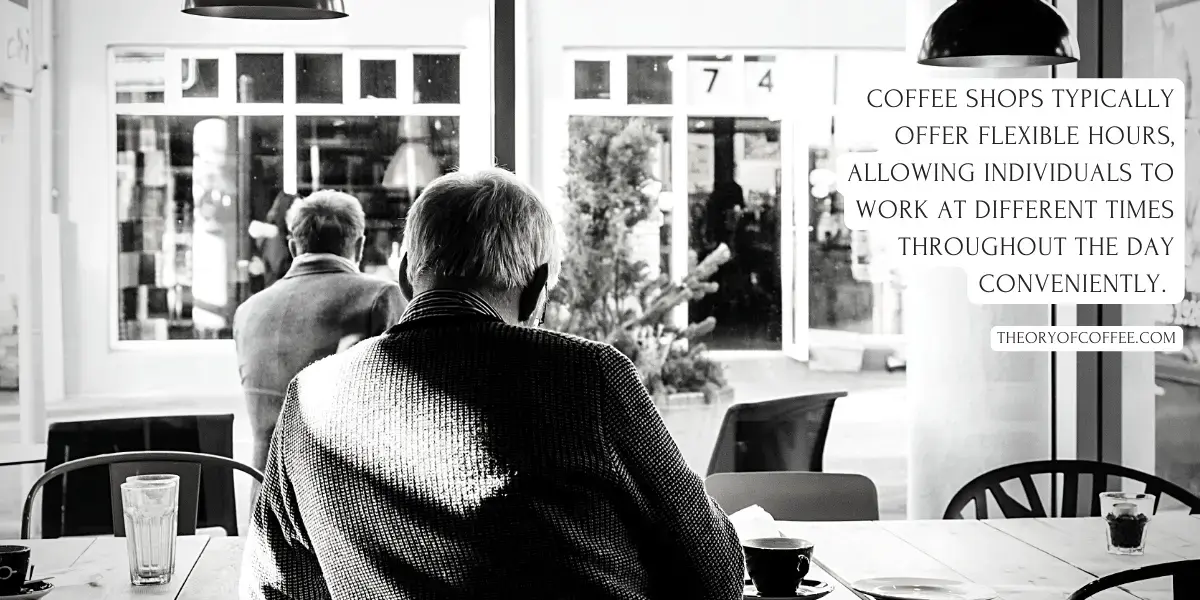
Working and socializing spaces in coffee shops are the dual role that coffee shops often play as environments where people can work or study and engage in social interactions. Coffee shops have become popular destinations for activities beyond simply getting a cup of coffee, including remote work, learning, meetings, and casual socializing. This trend has led coffee shops to design their spaces and services to accommodate these needs. Here's a closer look at the concept:
4.1. Working Spaces
Coffee shops offer a relaxed and comfortable environment that appeals to individuals seeking an alternative to traditional office settings. Here's how coffee shops serve as working spaces:
- Remote Work: With the rise of remote work, many people find coffee shops conducive places to work on laptops or tablets. The availability of Wi-Fi, power outlets, and comfortable seating makes it easier for individuals to be productive while enjoying coffee.
- Freelancers and Creatives: Freelancers, writers, designers, and other creative professionals often seek coffee shops for a change of scenery and a space that stimulates creativity.
- Studying: Students often appreciate coffee shops' quiet and focused atmosphere for studying, reading, or working on assignments.
- Flexible Hours: Coffee shops typically offer flexible hours, allowing individuals to work at different times throughout the day conveniently. This includes early mornings and late evenings, providing a suitable environment for diverse work schedules.
- Networking: Coffee shops can serve as informal networking spaces where professionals can meet for discussions, brainstorming sessions, or even job interviews.
4.2. Socializing Spaces
Beyond work and study, coffee shops are also popular venues for social interactions and gatherings:
- Casual Meetings: Coffee shops offer a comfortable setting for informal meetings, catching up with friends, or having discussions without the formality of an office or restaurant.
- Group Hangouts: Friends often choose coffee shops as places to gather, chat, and spend time together in a relaxed atmosphere.
- Community Events: Some coffee shops host events like open mic nights, book readings, art displays, or workshops, encouraging a sense of community engagement.
- Dates and Romantic Settings: Coffee shops provide cozy and intimate settings for dates, offering a more relaxed environment compared to traditional fine dining establishments.
- Cultural Exchange: Travelers and locals alike can interact and exchange stories, making coffee shops a space for cultural exchange and meeting new people.
- People Watching: The laid-back ambiance of coffee shops is conducive to people-watching, where individuals can observe the world around them while sipping their beverages.
Coffee shops have become versatile spaces catering to various needs and activities. They balance productivity and relaxation, enabling individuals to work efficiently while providing a welcoming space for socializing and connecting.
5. Local Gems vs. Chain Cafés
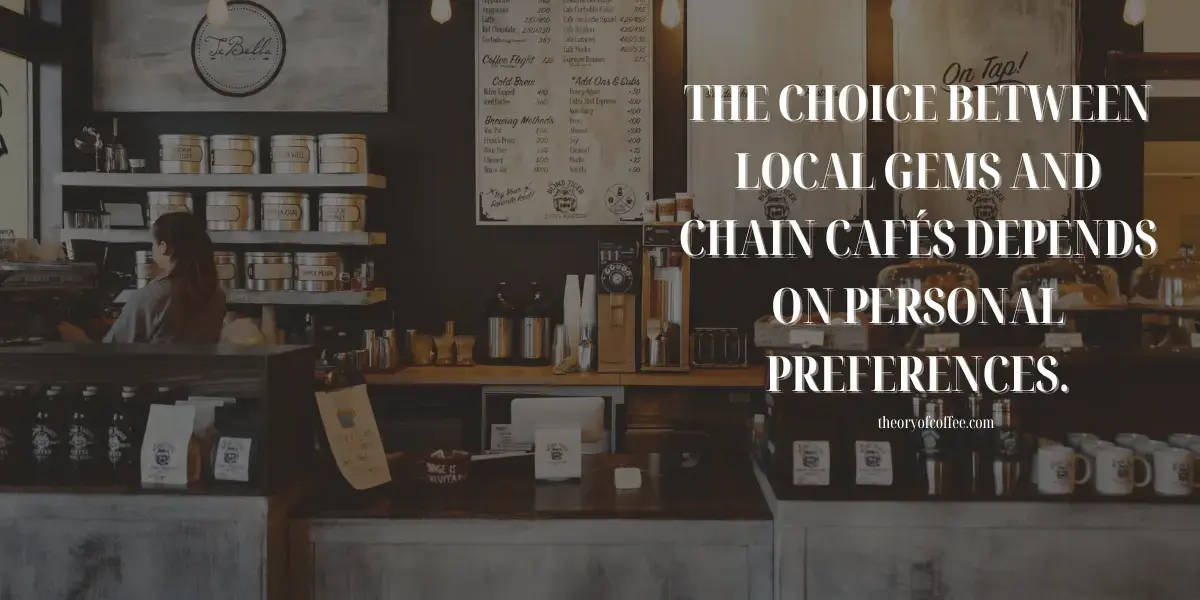
Local Gems vs. Chain Cafés refers to the distinction between independently owned and operated local coffee shops and larger chain or franchise coffee establishments. Each category has its characteristics, advantages, and drawbacks, contributing to the diversity of options available to coffee enthusiasts. Here's a breakdown of the key differences:
5.1. Local Gems (Independent Coffee Shops)
- Unique Identity: Local coffee shops often have a distinct personality, decor, and ambiance that reflects the owner's vision and the community's culture.
- Personalized Service: Owners and staff at local coffee shops often develop personal relationships with customers, remembering their preferences and fostering a sense of familiarity.
- Community Connection: Local coffee shops can become hubs for community engagement, hosting events, showcasing local art, and supporting neighborhood initiatives.
- Artisanal Approach: Many local shops focus on the quality of their coffee, often sourcing beans from specific regions or roasting their beans for unique flavors.
- Flexibility:Local coffee shops can adapt quickly to customer feedback and trends, introducing new menu items and offerings based on local preferences.
- Supporting Local Economy:Patronizing local businesses helps to support the local economy and encourage entrepreneurship within the community.
5.2. Chain Cafés (Franchise Coffee Shops)
- Consistency: Chain coffee shops offer consistent experiences, regardless of location, in terms of menu, decor, and service. This predictability can be reassuring for travelers.
- Convenience: Chain cafés are often found in multiple locations, making them convenient choices for those who want a familiar experience wherever they go.
- Brand Recognition: Chain coffee shops have established brands that customers recognize and trust, which can lead to a sense of reliability.
- Broad Menu: Chains usually offer a wide range of menu items, catering to various tastes and dietary preferences.
- Digital Integration: Many chain cafés have mobile apps, loyalty programs, and online ordering, making it convenient for customers to order ahead and earn rewards.
- Standardized Quality: Chains maintain quality control and standardized processes, ensuring customers receive a consistent product.
5.3. Considerations
- Atmosphere: Local shops often have a unique and personalized atmosphere, while chain cafés might have a more standardized and corporate feel.
- Support: Choosing local shops supports small businesses and local economies, while chain cafés contribute to more giant corporations.
- Variety: Chain cafés may have more extensive menus, but local shops might offer more artisanal and creative options.
- Connection: Local shops often provide a sense of community, while chain cafés might focus more on efficiency and quick service.
The choice between local gems and chain cafés depends on personal preferences. Some people appreciate the authenticity and uniqueness of local coffee shops. In contrast, others prefer the convenience and reliability of chain establishments. Both types of coffee shops contribute to the rich tapestry of coffee culture.
6. Sustainability and Ethical Practices
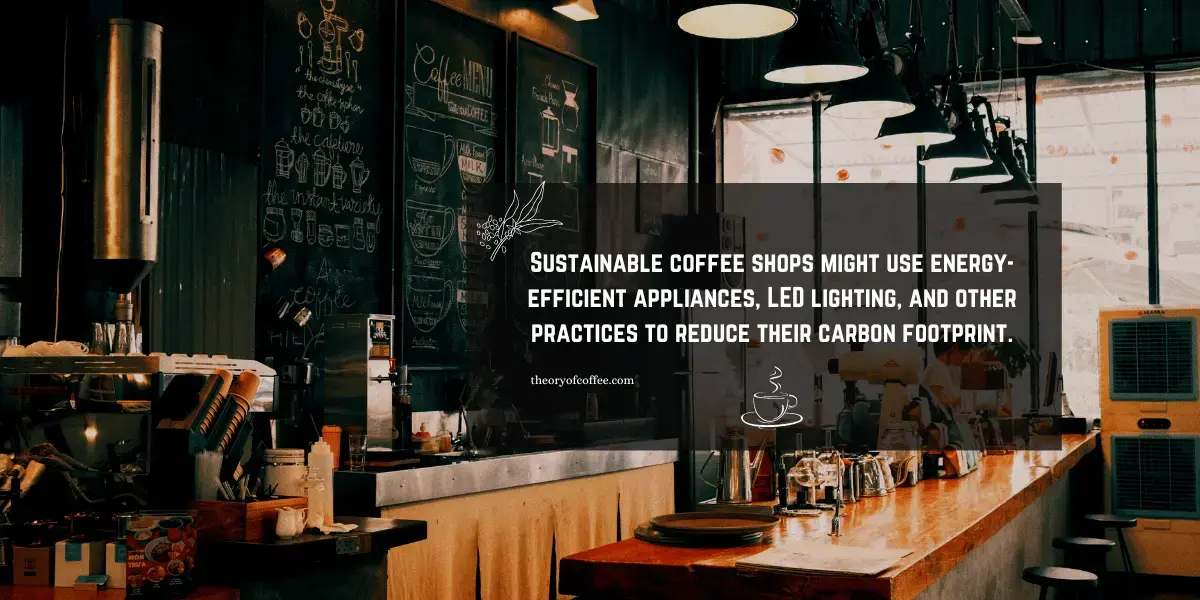
Sustainability and ethical practices in coffee shops have placed a growing emphasis on responsible environmental approaches and socially ethical methods for producing, sourcing, and serving coffee. With the increasing global demand for coffee, concerns about environmental impact, fair treatment of coffee farmers, and the industry's overall sustainability have gained prominence. Coffee shops play a crucial role in promoting and supporting these practices. To delve deeper into this concept:
6.1. Environmental Sustainability
- Sustainable Sourcing: Coffee shops committed to sustainability seek to source coffee beans grown using environmentally friendly practices. This may include organic farming, shade-grown cultivation, and using natural fertilizers.
- Direct Trade: Some coffee shops opt for direct trade relationships with coffee farmers, cutting out intermediaries and ensuring fair compensation for their products.
- Certifications: Coffee shops might opt for certified beans, such as Fair Trade, Rainforest Alliance, or Bird Friendly, which signify adherence to specific environmental and social standards.
- Reducing Waste: Coffee shops can implement strategies to minimize waste, such as using biodegradable or reusable cups, promoting recycling, and minimizing single-use items.
- Energy Efficiency: Sustainable coffee shops might use energy-efficient appliances, LED lighting, and other practices to reduce their carbon footprint.
6.2. Ethical Practices
- Fair Compensation: Coffee shops prioritizing ethical practices strive to ensure that coffee farmers are paid fair wages for their work and have access to resources that improve their quality of life.
- Community Support: Some coffee shops invest in the communities where coffee is sourced, providing education, healthcare, and infrastructure development resources.
- Transparency: Ethical coffee shops are transparent about their sourcing practices, sharing information about their coffee beans' origin and their initiatives' impact.
- Labor Rights: Coffee shops, from farmers to baristas, may support and advocate for fair labor practices along the supply chain.
- Diverse Partnerships: Coffee shops might collaborate with organizations and initiatives that promote social justice, gender equality, and inclusivity within the coffee industry.
6.3. Education
Ethical coffee shops might educate their customers about the challenges faced by coffee farmers and the importance of supporting ethical practices.
Coffee shops contribute to a more responsible and equitable coffee industry by adopting sustainability and ethical rules. They raise awareness among consumers, encouraging them to make informed choices aligned with their values. Through such actions, coffee shops wield the power to positively impact coffee-growing communities, preserve the environment, and promote ethical treatment of all stakeholders in the coffee supply chain.
7. Innovations in the Coffee Shop Industry
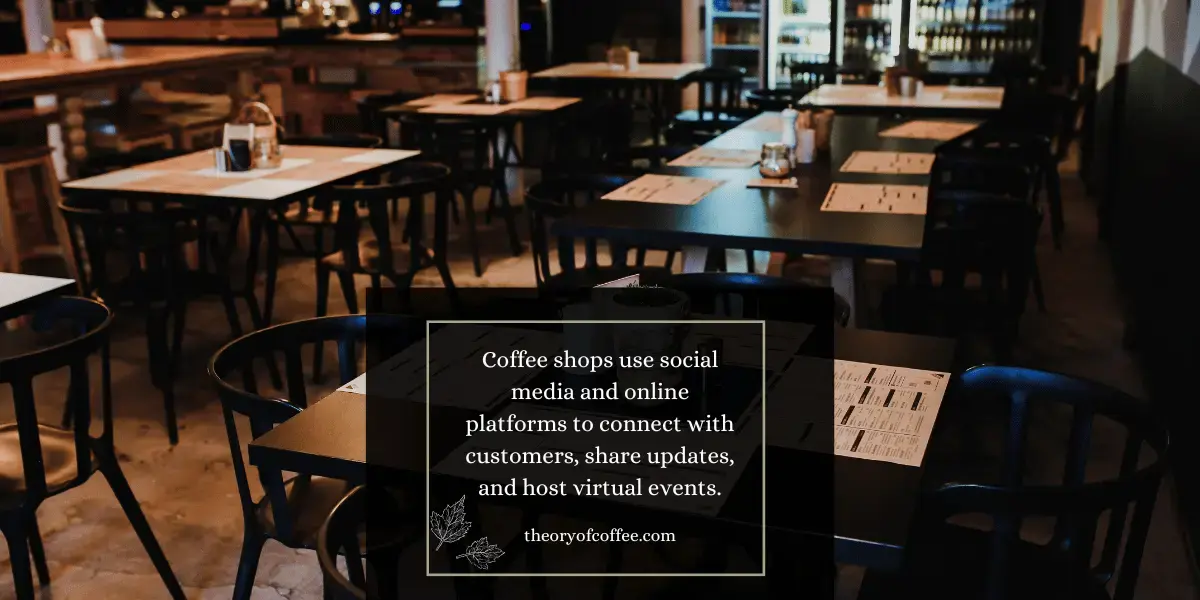
Innovations in the coffee shop industry are introducing and adopting new technologies, trends, and creative concepts that enhance and transform the traditional coffee shop experience. As the coffee industry evolves, coffee shops have embraced various innovations to cater to changing customer preferences, streamline operations, and offer unique and engaging experiences. Here are some notable innovations in the coffee shop industry:
- Mobile Ordering Apps: Many coffee shops today have developed mobile applications enabling customers to place their orders in advance conveniently. By embracing this technology, these establishments reduce wait times and enhance the overall customer experience.
- Contactless Payments: Adopting contactless payment methods, such as mobile wallets and QR codes, has expedited transactions and improved hygiene, especially in light of health concerns.
- Third Wave Coffee Movement: This movement emphasizes the appreciation of coffee as an artisanal product, focusing on high-quality beans, precise brewing methods, and a deep understanding of coffee origins.
- Single-Origin and Specialty Coffees: Coffee shops now showcase single-origin coffees with distinct flavor profiles, often providing detailed information about the region, altitude, and processing methods.
- Alternative Milks: The availability of plant-based milk options (e.g., almond, oat, soy) caters to customers with dietary restrictions or preferences.
- Cold Brew and Nitro Coffee: The popularity of cold brew and nitro coffee has led to dedicated taps for these beverages, offering a unique and refreshing experience.
- Interactive Experiences: Some coffee shops incorporate interactive elements, such as live coffee brewing demonstrations or educational coffee sourcing and preparation sessions.
- Eco-Friendly Initiatives: Coffee shops are increasingly adopting eco-friendly practices, such as using compostable cups, reducing plastic waste, and implementing recycling programs.
- Smart Coffee Equipment: Advanced espresso machines and coffee makers offer precise control over brewing variables, producing consistent and high-quality coffee.
- Virtual Reality and Augmented Reality: Coffee shops may experiment with VR/AR to offer immersive experiences, from virtual coffee farm tours to interactive menu displays.
- Multi-Sensory Experiences: Coffee shops might use scents, lighting, and soundscapes to create a unique, immersive atmosphere that enhances the coffee experience.
- Community Engagement: Coffee shops use social media and online platforms to connect with customers, share updates, and host virtual events.
- Coffee Subscriptions: Some coffee shops offer subscription services, regularly delivering freshly roasted beans to customers' doorsteps.
- Art and Design Integration: Coffee shops incorporate art installations, murals, and aesthetically pleasing design elements that enhance the visual appeal of the space.
- Hybrid Concepts: Some coffee shops combine elements of coworking spaces, bookstores, or art galleries to offer a multifunctional experience.
These innovations reflect the coffee industry's dynamic nature and consumers' evolving preferences. Coffee shops that embrace these trends can differentiate themselves, attract a broader range of customers, and provide memorable experiences beyond just serving coffee.
8. Conclusion
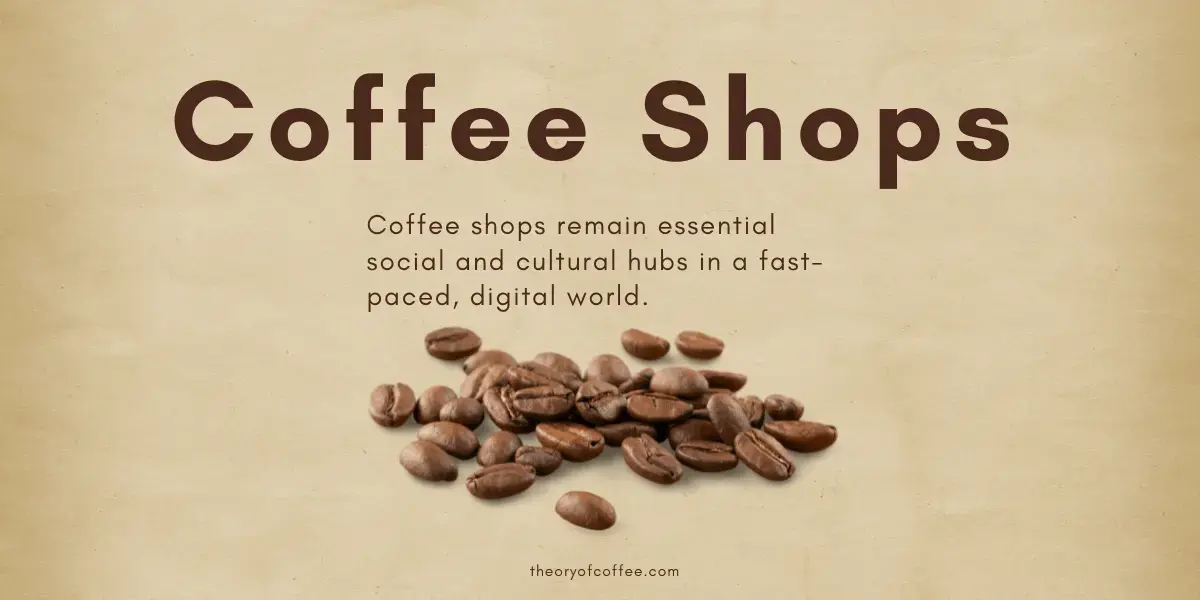
The world of coffee shops expands beyond mere caffeine pit stops. It encompasses a vibrant and diverse realm where culture, community, creativity, and convenience seamlessly converge. From the moment one enters a coffee shop, they are transported into an intentionally crafted environment that promises a genuinely distinctive experience.
Coffee shop culture has deep historical roots, originating as social hubs that fostered discussions, debates, and exchanging ideas. Over time, this culture has evolved to accommodate the modern needs of remote work, study, and relaxation. Coffee shops have become versatile spaces, acting as peaceful working environments and vibrant social gathering places.
The aesthetic and atmosphere of coffee shops play a pivotal role in creating these experiences. Whether you're drawn to the minimalist elegance, the cozy rustic charm, or the vibrant bohemian vibes, each coffee shop has its personality, inviting you to escape, engage, and immerse yourself in its ambiance.
Beyond coffee, the menu delights at coffee shops have expanded to offer a variety of treats and beverages. From pastries and sandwiches to teas and smoothies, coffee shops cater to various tastes and dietary preferences. This culinary diversity adds to the allure, making coffee shops an appealing daily destination.
Local gems and chain cafés each bring their strengths to the table. While local coffee shops offer a personalized touch, community engagement, and a sense of supporting local businesses, chain cafés provide familiarity, consistency, and convenient accessibility. The choice often depends on whether you seek a distinct, one-of-a-kind experience or a reliable and recognizable option.
The coffee shop industry continues to evolve, strongly emphasizing sustainability and ethical practices. Coffee shops are taking steps to source beans responsibly, reduce waste, support coffee-growing communities, and raise awareness about the environmental impact of coffee production. Through these initiatives, they're contributing to a more ethical and sustainable coffee industry.
Innovations are shaping the coffee shop experience in exciting ways. From mobile ordering apps to virtual reality-enhanced interactions, coffee shops are adapting to the digital age while staying true to their core values of connection, creativity, and culture.
Coffee shops remain essential social and cultural hubs in a fast-paced, digital world. They offer more than a cozy corner to work or a friendly space to catch up with friends. These vibrant establishments serve as sanctuaries, providing solace from the chaos outside. Within their walls, stories are shared, ideas are born, and connections are made. So, the next time you step into a coffee shop, take a moment to relish both the aroma of freshly brewed coffee and the rich experience that surrounds it.